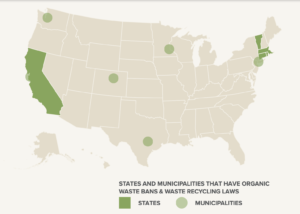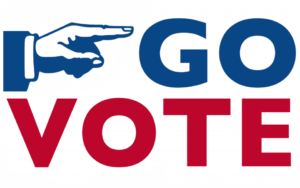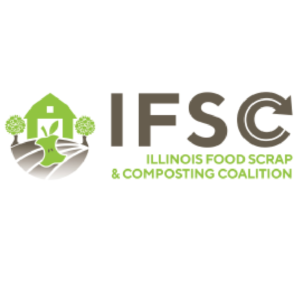Start Small but Think Big: Composting Around The Country
You may have heard the phrase "start small but think big” either here from me or from someone else. In my case, the “start small” usually refers to changing habits and reducing waste in your own household, and “think big” refers to helping to pass legislation that leads to greater impact.
There has been some recent good news in that regard, so good that it has trickled into the mainstream news. I first heard about Vermont’s Food Waste Ban because my colleague’s husband saw it on Instagram. I loved that! We thought you might like to know about what’s been happening vis-à-vis food waste legislation around the country.

The different states that have enacted food waste bans and organics recycling laws have had stepped approaches, starting small but thinking big. Many of them started with the bigger producers of organic waste, mandating them to find a solution other than landfilling. The Vermont ban seemed to come out of nowhere but it is actually something they’d been working on for at least four years. Though Vermont did actually work its way up to a 100% ban, I think that the word restriction might be more accurate for the policies that occurred before that point.
Four states have enacted food waste bans: Connecticut, Massachusetts, Rhode Island and Vermont. California has a mandatory organics recycling law.

You may notice that Illinois is not yet on this list. We realize that most of our readers are in Chicagoland. We want to empower you to help pass composting and food waste legislation in Illinois. It begins by registering to vote and electing officials who have a record of supporting environmental initiatives. We sometimes forget that the officials we elect work for us. It is our responsibility to let them know what matters to us and why. The squeaky wheel often does get the grease. You can be vocal about what you’d like to see happen in your community with your local officials. Here in Evanston, I’d start with contacting my alderman. It really is better if the message comes from both you and us.
Illinois Food Scrap & Composting Coalition is an organization in which we actively participate. In fact, our founder/owner Erlene Howard just joined the board. On their website is a list of composting legislation that has been passed in Illinois.
ReFED’s website was very helpful in my research for this blogpost. As the only U.S. nonprofit wholly dedicated to reducing food waste, it is ReFED's vision to eliminate food waste in order to increase food security, spur economic growth and protect the environment. I love maps and theirs shows very clearly the states and municipalities that have food waste laws. Their U.S. Food Waste Policy Finder allows you to find the state in their pulldown section and get up-to-date info on the policies in that state.
If you are very interested in the particulars of each of the five states that have passed laws to keep food out of landfills, you can download a report created by Harvard Law School Food Law and Policy Clinic (FLPC) that has a chart called State Organic Waste Bans & Recycling Laws Currently in Effect. You can do that by using the link above for ReFED’s U.S. Food Waste Policy Finder map and clicking on the type at the bottom of the map that reads: Download the full policy matrix. It has the following information for each state: food waste generators covered, waste production threshold to be covered, and distance exemptions. It’s on pages 12 and 13 of that report. Also included in that comprehensive report are statistics on States Regulating Date Labeling, States Regulating Food Sales Past Some Label Dates, State Liability Protection Laws, State Tax Incentives for Food Donation, and State Laws for Feeding Food Scraps to Swine. I did not make that one up.
In July 2019, FLPC created a toolkit titled Bans and Beyond: Designing and Implementing Organic Waste Bans and Mandatory Organics Recycling Laws.

Biocycle magazine is another great source for nationwide composting news. Their tagline is: The Organics Recycling Authority since 1960. Their article titled Organic Waste Bans and Recycling Laws To Tackle Food Waste is from September 2018 but does a good job of explaining what the considerations are in designing policy.
When I saw this article on Sustainable America’s website: Are Food Waste Bans Working?, I’ll admit that I crossed my fingers and hoped the answer was yes. Spoiler alert: the short answer is yes. The amount of overall waste is going down and composting and food recovery and donations are going up.
This also seemed like a great time to explain some waste industry terminology.
Tipping Fee: You’d need to know that we are not talking about gratuities here. Tipping in waste hauling terms means dumping off material. Our trucks are weighed before and after tipping and based on that weight, we are charged a tipping fee.
Pay as you throw (PAYT): This system of charging for waste hauling has been very successful in the US and in other parts of the world. It has been known to reduce the overall amount of waste. Instead of everyone paying the same flat fee, you pay more or less depending on how much waste you generate. Waste is treated like utilities like electricity and gas. The EPA has a page in their archive that explains this further.
Yard waste tagalong: Many municipalities choose this option because it’s easy to implement. During the yard waste season, food scraps are allowed to tag along in the same receptacles often at no extra charge. This is a good residential solution for people who have and use their yard waste bins and find it difficult to work the cost of a separate food scrap hauling service into their budget. It has some downsides in that the yard waste season is only 8 months. Also participation in the program is hard to track and underutilized. We encourage people who have chosen this option to use our container-swap service during the winter and early spring months in order to keep up the sustainable habit of diverting their food scraps from the landfill.

There is a good chance that you are already one of our customers. Congratulations! You’ve already started small! What could be your next step? Could you talk to your neighbors, either on your block or in your multi-unit building? Could you host one of our Neighbor Totes? Could you write to your city or state representatives? Could you write a letter to the editor or an opinion piece on the topic? Here is a guide on how to do that from Sierra Club’s website. Who do you know who would like to know about us?
